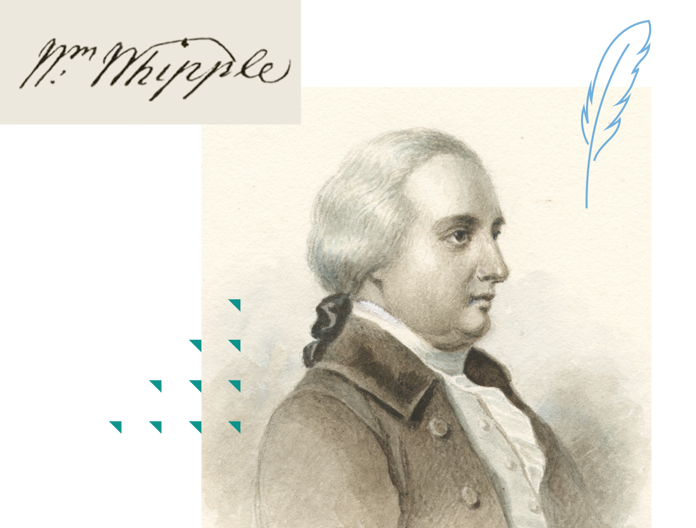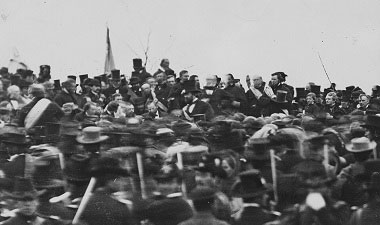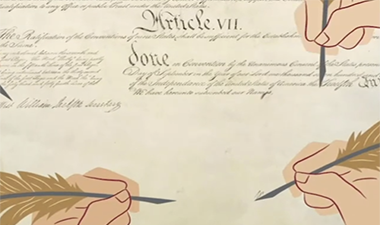Summary
William Whipple was a delegate to the Continental Congress during the final debate over independence. He commanded a brigade that performed heroically at the Battle of Saratoga.
William Whipple | Signer of the Declaration of Independence
2:21
Biography
William Whipple was born in Kittery, Maine, in 1730. He was the son of a sea captain and brewer of the same name and a mother, Mary, who inherited a fortune from her father. William went to a common school until his early teens, but his education was enhanced by sessions with a tutor who was his mother’s cousin. When still a teenager, William Whipple decided to follow in his father’s footsteps and went off to sea in one of the senior Whipple’s ships. At 21, he became a ship’s master.
Whipple grew wealthy through his participation in the triangular trade between North America, the West Indies, and Africa, trading in rum, wood, and enslaved people. By 1759, he had quit life at sea and established a mercantile company with two of his brothers as partners. In 1767, at the age of 37, he married his first cousin Catherine Moffat and the couple soon moved to Portsmouth, New Hampshire. Although they had several children, none survived childhood.
Whipple’s success led ultimately to a role in politics that came as the relationship between Britain and the colonies was teetering on the brink of dissolution. In 1775, New Hampshire organized a new governing body known as the Provincial Congress after dissolving the British royal government. Whipple was elected to this body to represent Portsmouth. Like Josiah Bartlett, a fellow opponent of British rule in New Hampshire, Whipple also became a member of the province’s Committee of Correspondence.
Along with Bartlett, Whipple was a delegate to the Continental Congress during the final debate over independence. He wrote to Bartlett in January of 1776 about the coming session of the Congress,“ This year, my Friend is big with mighty events. Nothing less that the fate of America depends upon the virtue of her sons, and if they do not have virtue enough to support the most Glorious Cause ever human beings were engaged in, they don’t deserve the blessings of freedom.” When the time came to vote, both men offered resounding support for the Declaration of Independence.
Unlike many of the men who supported the “Glorious Cause,” Whipple decided that no man could hold another in bondage while fighting for freedom. He came to this conviction when his own enslaved servant, Prince, pointed out that Whipple was going to fight for his own liberty while he, as a black man, had “none to fight for.” Whipple conceded the point and offered Prince his freedom on the condition that Prince would fight the British. Whipple approved the move to allow African American regiments to be formed in the continental army. “This, I suppose,” he wrote, “will lay a foundation for the full emancipation of those wretches . . . . I hope it will be the means of dispensing the blessings of Freedom to all the human race in America.” This sentiment is striking as it came from a man who once profited from the slave trade.
Whipple’s own military service began in 1777. He commanded a brigade of four regiments who performed heroically at the Battle of Saratoga. Major General Gates recognized Whipple’s leadership in the campaign by naming him one of the two men to determine the terms of capitulation by British General Burgoyne. Through word of mouth, Benjamin Franklin, then in Paris, learned of the victory and used the news effectively as he negotiated an alliance with the French.
At war’s end, Whipple returned to his home in New Hampshire to take up an appointment as an associate justice of the Superior Court. But in the autumn of 1785, while traveling his court circuit, a heart ailment caused him to faint and fall from his horse. He was confined to his room until November 28 when he died. He was 55 years old.
On December 9, 1785, the New Hampshire Gazette noted his passing, writing, “In him concentrated every principle that exalts the dignity of man. His disinterested patriotism and public services are now known to all. And when newspaper encomiums are lost in oblivion, the pen of the historian shall preserve the remembrance of his virtue in the breast of succeeding generations. . . . He was generous and humane, and the elements so mixed in him that nature might rise up and say THIS WAS A MAN.”








